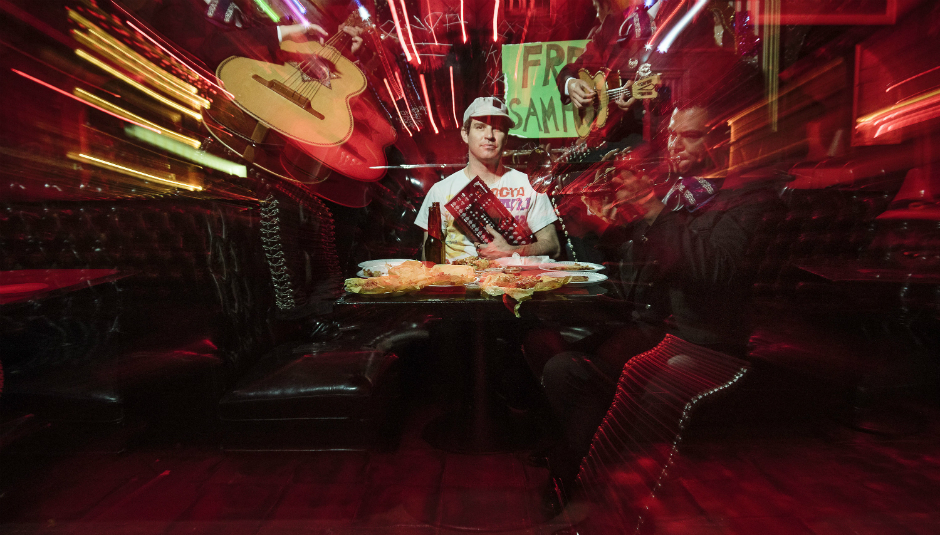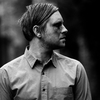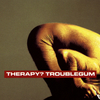With all the hoopla about Radiohead performing in Israel floating around the viral airwaves, I think it’s high-time to put all talk about the Oxfordshire lads to bed indefinitely. Just kidding of course. But with all tongue-in-cheek musical blasphemies aside, at this point Animal Collective has long passed the bar of what constitutes a transcendent, sonically audacious, and overall phenomenal band. What germinated out of four eccentric kids sharing and trading experimental records back and forth eventually blossomed into one of the new millennium's prized possessions.
2003’s Here Come The Indian properly introduced them to the world, and subsequent albums like Sung Tongs, Strawberry Jam, and Merriweather Post Pavilion demonstrated an almost uncanny ability to simultaneously diversify their output in extravagant measures while remaining faithful to their synth-heavy, ambient sound. By now, it’s far from a stretch to say they have been one of the most proficient bands of the modern era.
The buck hardly stops with their work as a group however. Over the years the members of the group have amassed distinguished side projects as well. Panda Bear’s (Noah Lennox) Person Pitch is adored by virtually everyone with at least one functioning ear, and inspired an entire legion of musicians. A year ago Deakin (Josh Gibb) released Sleep Cycle to universal acclaim. But even the other members would attest that the most critical factor of the band’s success revolves around the mind of Avey Tare (Dave Portner), the principal songwriter and sonic architect behind most of the band’s material.
But if the average Animal Collective fan has been a little underwhelmed by Portner’s side projects in the past, it’s only because everything he touches is expected to ring in harmonious gold (it also doesn’t help that Lennox’s Person Pitch is regarded as one of the greatest albums ever made). Portner’s side project Avey Tare’s Slasher Flicks was satisfying but a tad bit disappointing.
But after having worked on the group EP The Painters and collaborated on Meeting Of The Waters (both released this year), Portner has just released Eucalyptus, his first solo effort since 2010’s dark, introspective Down There. The positive feedback is already rolling in – according to DiS’s own Russell Warfield “He’s revisiting some of the most fertile soil of his past work – bringing together his childlike enthusiasm with his penchant for gloomy undercurrents – and making it all sound as fresh and blissful as ever.”
DiS recently spoke with Portner about his overall inspiration for Eucalyptus, clearing up some prevalent rumours, collaborating with his ex-girlfriend, and how the album came about.
DiS: Unlike a lot of musicians, I’ve noticed that throughout your career you don’t speak about your music in a pompous sort of way. It’s almost like you don’t believe the hype surrounding you and your work, even though it’s highly esteemed.
Avey Tare: It’s just good not to dwell on neither the negative or the positive criticism. I don’t want to be affected by that kind of stuff, I don’t want to be influenced in any way by that whatsoever. It’s difficult to hear that kind of stuff and not be affected by it at least by some measure. But most importantly, in the long run, it doesn’t aid my process at all. And that’s what mostly matters. I feel very lucky to live the life I’m living and never try to forget that. But beyond that, people saying things like: “You’re a famous rockstar,” overall it’s very weird for me. As Animal Collective we just like to have our own relationships with each other and have a good connection with the outside world, but not be affected by the attention. And we’ve being doing it this way for so long it's always interesting to see where things are going.
I’ve heard that you use music to document certain times in your life? How would you describe the period that Eucalyptus was made?
For me it's really California focused, especially living in L.A. and spending time in Big Sur. Mainly the beautiful surroundings like the mountains and shrubbery. A lot of the inspiration came from travelling to Big Sur and meeting with close friends. But being from Baltimore and now living in L.A., my life has had a progression of change. After constant work, I’ve taken time off in between two Animal Collective tours. It’s allowed me to reconnect with the past. As a result, the album is more home-oriented, more of a bedroom feel. While I was making the record there was a studio below my place, and consequently, the record has kind of a basement-like sound and feel. The recording process was homey, it took me back to memories of my high school days. I was working with tape more than a computer, more of like what Josh does.
Speaking in terms of Big Sur and its prominent natural surroundings, the writer Henry Miller once said of the city: “There is nothing to improve on in the surroundings, the tendency is to set about improving oneself.” How does that match up with your own experience?
I think Big Sur’s vastly interesting in a number of different ways. I feel strongly that any sort of overwhelming natural environment or wilderness makes one look inward and thus have a tendency to look inside and internally reflect. In Big Sur in particular, it’s so overwhelming in a glorious sort of way. Natural surroundings, especially in abundance, always has some profound psychological effect on me. It’s like renewing oneself. The effect is more metaphysical and about improving your mind. And that’s a large part of what I’m touching on in the record.
How do you come up with new ideas after having run the gamut on experimentation so to speak? What is your creative process like in the studio?
It’s extremely hard to put a finger on it, speaking in terms of inspiration, coming up with new ideas, and the songwriting process in general. I’m always working on something musical. One thing that is really useful is being able to move around different artistic mediums, like DJing sometimes or playing music by myself or with others. I think of a lot of ideas by playing around with different instruments. Sometimes getting inspiration is as simple as just taking a break. But I sometimes feel that the more mysterious, enigmatic things are the best for making music. Sometimes the inspiration just comes out of nowhere. At that point, the songwriting is really organic when it just comes out of the air.
I’ve heard you have synesthesia, allowing you to associate different sounds with different colours. How does that help with the craft?
That’s not true, I don’t have synesthesia. I’ve been asked about that a lot from many people, but it’s simply not true.
You mean I’ll be the first one to break the story?
I guess so (laughs).
My favourite songs on the album are ‘Lunch Out Of Order’ Part 1 and 2, respectively. The sonic texture on both is incredible. How did those arrangements come about?
The whole idea of a large puzzle ties into those records. In a way, the whole record is a lot of different puzzle pieces fitting together in an emotional sort of way, like ‘In Pieces’, I wanted to make a song with random sounds tied together in an elegant sort of way. I’m influenced a lot by 20th Century classical composition. I wanted to create a song that can be played out of order. I wanted the beat to be sort of a progression, like where it goes with ‘Lunch Out Of Order Part 2’. I feel like Part 2 is like me taking a snapshot while hiking around and checking out the surrounding scenery. In general, I feel that hiking is a very good way to promote internal thinking. When I hike I’m always thinking and doing a lot of introspection.
Your songwriting is praised for a lot of things, especially your storytelling. Can you talk about how ‘PJ’ came about?
PJ was a friend of mine, he passed away some years ago. It hurt me greatly and had a profound effect on me. He was just one of those people that was really important to me in a lot of ways. Anyone who’s lost someone can relate. Having someone really close to me pass gave me a new sense of life. Not a day goes by when I don’t think about him dying. Writing and recording the song was a cathartic experience. I came into songwriting by penning short stories and exploring creative writing, so I wanted to write the song like a short story. ‘PJ’ is one of my favourite songs I’ve ever written, mainly because of the subject matter and how emotional it was crafting the song.
What was it like collaborating with ex-girlfriend Angel Deradoorian (former Dirty Projectors and Avey Tare’s Slasher Flicks member)?
We’re close friends now. I won’t lie, there were definitely ups and downs to working together. But I feel like all in all it was pretty easy to collaborate. One thing I want to clear up that’s been floating around is it is not a breakup record; it doesn’t touch on breaking up like in terms of love and romantic relationships. But there are a lot of songs about relationships with my friends and my overall relationship to change in general and change in the world.
Do you find it easier or more difficult to work solo?
It’s not hard writing solo, but it’s difficult for me to record alone. I wanted to have a little more of a live feel for Eucalyptus and it’s easier to work with Josh when recording. The great thing about our dynamic is that we’re able to hang out and have fun but still work. I would say that it’s more difficult to perform solo though.
What were you listening at the time you made the album?
A variety of different things. Over the last six years or so I’ve gotten a lot into jazz. Ahmad Jamal is one of my favourite piano players of all time. Chico Hamilton is another of my favourite musicians, which kind of takes me into Eric Dolphy land. I’m also heavily into stonier 70’s jazz records. I also listen to a lot of Hawaiian music. I went to Hawaii a couple of times while making the album. One of the things that influenced me in particular about the Hawaiian sound is the pedal steel guitar. It influenced me to incorporate a kind of islandy sound on the album.
Your music, falling into the psychedelic genre at times, is often associated with drug use. How do you feel about that link?
I don’t mind it. Drugs can be a touchy subject, especially when art is involved. Certainly within the arc of the music industry there is a history of artists heavily using marijuana and things like mushrooms. I’ve certainly smoked a good amount of weed and written music afterwards, and I personally don’t see anything wrong with it. But I think you can do a lot of creating and playing without that stuff involved. I don’t use hard drugs. I don’t see psychedelics as hard drugs or consider weed a drug at all. But I do have friends who have used hard drugs and have seen them go down really dark roads. That’s not something I want to be apart of or see happening with another person.
Is there anything specific you want people to take away from the album?
Just their own thoughts and ideas, whatever that might be. I feel like it’s a real transportive record in a deep sense. Eucalyptus is a very healing plant for me. I hope people can lose themselves in the record and have their own positive experience, having musically the same effect that the plant has on me.
With such a talented group of musicians in Animal Collective, is there ever a sense of good-spirited competition to top the others in your side projects?
Not really, I’m not really a competitive person by nature. I think it’s more of us each inspiring one another. It’s what we’ve done since we were younger, showing each other different ways of song production and writing. I think that’s why we work so well together because we all have different personalities and influence one another in a symbiotic way; e all bring something different to the table. I think it’s hard to think of it as competition because the other dudes do things I can’t do or I don’t have the same aesthetic to do. I think that’s part of the beauty of it, so many creative individuals in one setting bringing fresh ideas into the fold and experimenting.
Eucalyptus is out now via Domino Records. For more information about Avey Tare, please visit his official website.
Photo Credit: Atiba Jefferson






















